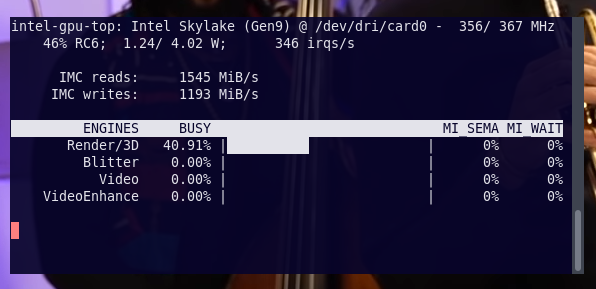I have an oldish laptop running EndeavourOS KDE Plasma in Wayland mode fairly well.
This is the output of inxi -SMCGca --no-host:
System:
Kernel: 5.15.2-arch1-1 x86_64 bits: 64 compiler: gcc
v: 11.1.0
parameters: BOOT_IMAGE=/boot/vmlinuz-linux
root=UUID=4b6f4202-342c-4853-9fff-4539f296ad3c rw quiet
loglevel=3 nowatchdog
Desktop: KDE Plasma 5.23.3 tk: Qt 5.15.2 wm: kwin_wayland
vt: 2 dm: LightDM 1.30.0, SDDM Distro: EndeavourOS
base: Arch Linux
Machine:
Type: Laptop System: Dell product: Inspiron 15-3567 v: N/A
serial: <superuser required> Chassis: type: 9
serial: <superuser required>
Mobo: Dell model: 0FGN4M v: A00
serial: <superuser required> UEFI: Dell v: 01.07.00
date: 04/07/2017
CPU:
Info: Dual Core model: Intel Core i3-6006U bits: 64
type: MCP arch: Skylake family: 6 model-id: 4E (78)
stepping: 3 microcode: EA cache: L2: 3 MiB
flags: avx avx2 lm nx pae sse sse2 sse3 sse4_1 sse4_2 ssse3
vmx
bogomips: 8003
Speed: 800 MHz min/max: 400/2000 MHz Core speeds (MHz):
1: 800 2: 861
Vulnerabilities: Type: itlb_multihit
status: KVM: VMX disabled
Type: l1tf mitigation: PTE Inversion; VMX: conditional
cache flushes, SMT disabled
Type: mds mitigation: Clear CPU buffers; SMT disabled
Type: meltdown mitigation: PTI
Type: spec_store_bypass mitigation: Speculative Store
Bypass disabled via prctl and seccomp
Type: spectre_v1 mitigation: usercopy/swapgs barriers and
__user pointer sanitization
Type: spectre_v2 mitigation: Full generic retpoline, IBPB:
conditional, IBRS_FW, RSB filling
Type: srbds mitigation: Microcode
Type: tsx_async_abort status: Not affected
Graphics:
Device-1: Intel Skylake GT2 [HD Graphics 520] vendor: Dell
driver: i915 v: kernel bus-ID: 00:02.0 chip-ID: 8086:1916
class-ID: 0300
Device-2: Realtek Integrated_Webcam_HD type: USB
driver: uvcvideo bus-ID: 1-5:2 chip-ID: 0bda:5769
class-ID: 0e02 serial: 200901010001
Display: wayland server: X.Org 1.21.1.3
compositor: kwin_wayland driver: loaded: intel
unloaded: fbdev,modesetting,vesa display-ID: :1 screens: 1
Screen-1: 0 s-res: 1366x768 s-dpi: 96
s-size: 361x203mm (14.2x8.0") s-diag: 414mm (16.3")
Monitor-1: XWAYLAND0 res: 1366x768 hz: 60 dpi: 102
size: 340x190mm (13.4x7.5") diag: 389mm (15.3")
OpenGL: renderer: Mesa Intel HD Graphics 520 (SKL GT2)
v: 4.6 Mesa 21.2.5 direct render: Yes
So this laptop does not have nvidia, just Intel.
I’m wondering if it’s possible to have “hardware acceleration” available when I’m playing videos via mpv.
I don’t have mpv.conf in ~/.config or in /etc/mpv.
This is what I see with just mpv:
(+) Video --vid=1 (*) (vp9 1920x1080 23.976fps)
(+) Audio --aid=1 --alang=eng (*) (opus 2ch 48000Hz)
AO: [pulse] 48000Hz stereo 2ch float
VO: [gpu] 1920x1080 yuv420p
AV: 00:00:13 / 00:14:08 (2%) A-V: 0.000
Exiting... (Quit)
And this is what I see with both mpv --hwdec=auto or with mpv --hwdec=vaapi:
(+) Video --vid=1 (*) (vp9 1920x1080 23.976fps)
(+) Audio --aid=1 --alang=eng (*) (opus 2ch 48000Hz)
[ffmpeg] AVHWDeviceContext: Failed to query surface attributes: 20 (the requested function is not implemented).
[vo/gpu/vaapi-egl] failed to retrieve libavutil frame constraints
Cannot load libcuda.so.1
[ffmpeg/video] vp9: No support for codec vp9 profile 0.
AO: [pulse] 48000Hz stereo 2ch float
VO: [gpu] 1920x1080 yuv420p
AV: 00:00:02 / 00:14:08 (0%) A-V: 0.000
Exiting... (Quit)
The video in question was downloaded from YouTube as a .webm file.
The ArchWiki on mpv suggests using --gpu-context=wayland but mpv --gpu-context=wayland or mpv --gpu-context=wayland --hwdec=auto mpv --gpu-context=wayland --hwdec=vaapi don’t make a difference as seen by running sudo intel_gpu_top:

Does my laptop allow for hardware acceleration? If it does, are there additional packages that need to be installed?
$ pacman -Q | grep -E "(intel|mesa)"
intel-gmmlib 21.3.2-1
intel-gpu-tools 1.26-1
intel-media-driver 21.4.1-1
intel-ucode 20210608-1
libva-intel-driver 2.4.1-1
libva-mesa-driver 21.2.5-1
mesa 21.2.5-1
mesa-demos 8.4.0-4
xf86-video-intel 1:2.99.917+916+g31486f40-2
$
In case it helps, here’s the output of vainfo:
Summary
$ vainfo
vainfo: VA-API version: 1.13 (libva 2.13.0)
vainfo: Driver version: Intel iHD driver for Intel(R) Gen Graphics - 21.4.1 ()
vainfo: Supported profile and entrypoints
VAProfileNone : VAEntrypointVideoProc
VAProfileNone : VAEntrypointStats
VAProfileMPEG2Simple : VAEntrypointVLD
VAProfileMPEG2Simple : VAEntrypointEncSlice
VAProfileMPEG2Main : VAEntrypointVLD
VAProfileMPEG2Main : VAEntrypointEncSlice
VAProfileH264Main : VAEntrypointVLD
VAProfileH264Main : VAEntrypointEncSlice
VAProfileH264Main : VAEntrypointFEI
VAProfileH264Main : VAEntrypointEncSliceLP
VAProfileH264High : VAEntrypointVLD
VAProfileH264High : VAEntrypointEncSlice
VAProfileH264High : VAEntrypointFEI
VAProfileH264High : VAEntrypointEncSliceLP
VAProfileVC1Simple : VAEntrypointVLD
VAProfileVC1Main : VAEntrypointVLD
VAProfileVC1Advanced : VAEntrypointVLD
VAProfileJPEGBaseline : VAEntrypointVLD
VAProfileJPEGBaseline : VAEntrypointEncPicture
VAProfileH264ConstrainedBaseline: VAEntrypointVLD
VAProfileH264ConstrainedBaseline: VAEntrypointEncSlice
VAProfileH264ConstrainedBaseline: VAEntrypointFEI
VAProfileH264ConstrainedBaseline: VAEntrypointEncSliceLP
VAProfileVP8Version0_3 : VAEntrypointVLD
VAProfileHEVCMain : VAEntrypointVLD
VAProfileHEVCMain : VAEntrypointEncSlice
VAProfileHEVCMain : VAEntrypointFEI
$